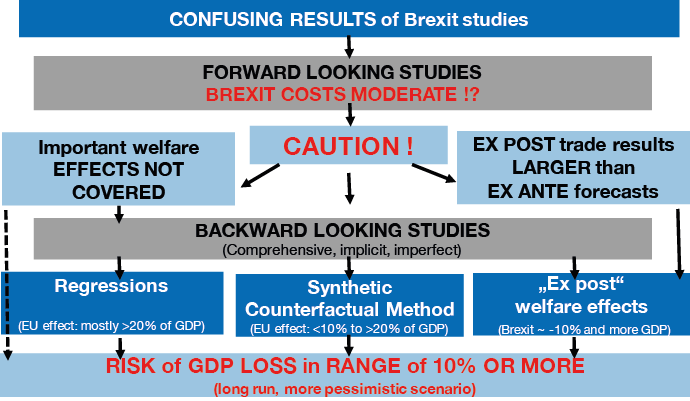Cliff Mitchell - 08/01/2018
Call me old fashioned but I need experts - the economic impact of Brexit

The Economic Impact of Brexit
Call me old fashioned but I need experts – people who dedicate their lives to studying and understanding the complexities of our world and try to make it a better place for all of us. I can’t be an expert in everything so when I want to know about something complex, I’ll go to the experts.
I also like the ‘peer review’ process whereby an expert who has researched a particular issue submits their findings to a panel of other experts in that area for assessment before it is allowed to be published in a reputable journal. Once published other experts then attempt to replicate the findings, or to challenge them. This is a proven and healthy method that has withstood the test of time and provides a degree of assurance about the quality of what you are reading.
I am not an economist but I really want to understand the economic impact of Brexit, and get beyond the misinformation, point scoring, and outright lies that abound today. So, naturally, I turn to experts in this area, economists, to help me understand what is really going on.
Believing as I do in the power of ‘peer review’ I naturally turn to the peer reviewed literature in economics. I have access to reputable journals and can search for papers published on Brexit using tools like Google Scholar (https://scholar.google.co.uk), but journal articles can be abstruse to us non-experts, and it’s sometimes difficult to differentiate the outliers from the consensus view.
Fortunately help is at hand here too because academics kindly undertake literature reviews and meta-analyses for us.
- A literature review is a search and evaluation of the available literature in a given subject. It documents the state of the art with respect to the subject or topic.
- A meta analysis uses a statistical approach to combine the results from multiple studies in an effort to increase power (over individual studies), improve estimates of the size of the effect and/or to resolve uncertainty when reports disagree.
In order to understand the true impact of Brexit on the UK economy I have, therefore, looked to the peer reviewed literature to find meta-analyses and literature reviews. What have I found?
1. Literature Reviews
In April 2016 Professor Nicholas Crafts, Director of the University of Warwick’s ESRC Centre on Competitive Advantage in the Global Economy (CAGE) published a study on ‘The Growth Effects of EU Membership for the UK: Review of Evidence.(1)
This paper reviewed the literature on the implications of EU membership for the UK. It concluded that the economic benefits of EU membership for the UK have far exceeded the costs of budgetary transfers and regulation. The impact was an annual gain equivalent to about 10 per cent of GDP.
“ EU membership has raised UK income levels appreciably and by much more than 1970s’ proponents of EU entry predicted. These positive effects stem from the EU’s success in increasing trade and the impact of stronger competition on UK productivity. The economic benefits of EU membership for the UK have far exceeded the costs of budgetary transfers and regulation.”
Joining the EU “...raised the level of real GDP per person in the UK compared with the alternative of staying in EFTA… the impact was an annual gain equivalent to about 10 per cent of GDP. This far exceeded the ‘membership fee’ required in terms of the net budgetary contribution and net costs of regulation which have totalled about 1.5 per cent of GDP.”
“Brexit could mean that the UK gives up some of the benefits that it has obtained from EU membership. It is unlikely that all the gains would be lost but a scenario where the UK does not negotiate continued membership of the Single Market and also fails to liberalize non-EU trade and to de-regulate could easily entail net welfare costs of the order of 2.2 per cent of GDP.”
So, according to this literature review, the UK economy is about 10% better off than it would have been had we not joined the EU, and leaving the Single Market would make us about 2.2% worse off.
2. Meta-analysis
In April 2016 two academics from the Cologne Institute for Economic Research undertook a meta-analysis ‘The economic impacts of Brexit: Results from a meta-analysis’(2) and found that
“...in case of Brexit, GDP losses for the UK in the range of 10% or more cannot be ruled out in the long run” and “overall, a Brexit would indeed resemble a potentially dangerous leap in the dark”
3. Economic Models
Another approach to understanding the economic impact of Brexit is to look at economic models – representations of the economy using sophisticated mathematics and computer models. One such model, NiGEM is used by the OECD and the UK Treasury. NiGEM has been developed over 30 years and is funded by international institutions, central banks, finance ministries and private institutions from around the world - it is a highly respected model.
In May 2016 two academics from the National Institute of Economic and Social Research published the results of a study ‘The long-term economic impact of leaving the EU.(3) This study compared several recent studies, including those by HM Treasury, and used the NiGEM model to assess the impact of different Brexit scenarios. Their key findings are summarised as:
“We find that by 2030, GDP is projected to be between 1.5 per cent and 3.7 per cent lower than in the baseline forecast in which the UK remains in the EU. Real wages fall somewhat more, by between 2.2 per cent and 6.3 per cent. Consumption is also hit somewhat harder than GDP, falling by between 2.4 and 5.4 per cent. Real wages and consumption decline more than GDP in the long term due to a long-term deterioration in the terms of trade, coupled with a shift towards savings.”
Conclusions
The evidence from this research is clear – we will all be significantly worse off if Brexit goes ahead, regardless of the type of Brexit we end up with – there is NO positive economic benefit to leaving the EU. Remember that this conclusion is not based on any one study, but is based on a review of all the relevant peer reviewed literature and a meta-analysis. Brexiters will of course quote the one study that found the opposite – that Brexit would be good for the economy. This paper came from the campaigning group Economists for Brexit group, and Professor Patrick Minford, so its biases are immediately clear. And, fortunately, the peer review process allows other experts to challenge published work and in this case found it fundamentally flawed(4)
“The Economists for Brexit predictions are inconsistent with the basic facts of international trade”
“Minford’s model is inconsistent with two basic facts about international trade: first, that trade satisfies the gravity equation; and second, that the EU has been trade-creating, not simply a tool for trade diversion.”
“Their forecast of income gains from Brexit contrasts with all other economic analysis.”
So, when Brexiters try and tell you how much better off we will all be after Brexit, you know they are wrong, and we are actually 10% better off because of our membership of the EU.
- Crafts, N., 2016. The Growth Effects of EU Membership for the UK: a Review of the Evidence. Competitive Advantage in the Global Economy (CAGE), Global Perspectives Series: Paper, 7.
http://www.smf.co.uk/wp-content/uploads/2016/04/SMF-CAGE-The-Growth-Effects-of-EU-Membership-for-the-UK-a-Review-of-the-Evidence-.pdf - Busch, Berthold; Matthes, Jürgen (2016) : Brexit - the economic impact: A meta-analysis, IW-Report, No. 10/2016
http://voxeu.org/article/meta-analysis-economic-impact-brexit - Ebell, M. & Warren, J., 2016. The Long-Term Economic Impact of Leaving the EU. National Institute economic review., 236(1), pp.121–138.
http://journals.sagepub.com/doi/pdf/10.1177/002795011623600115#articleCitationDownloadContainer - Economists for Brexit (2016). ‘The Economy After Brexit’
https://issuu.com/efbkl/docs/economists_for_brexit_-_the_economy - Economists for Brexit: A Critique
http://cep.lse.ac.uk/pubs/download/brexit06.pdf
Credits
Cliff Mitchell
 ourEU.UK
ourEU.UK